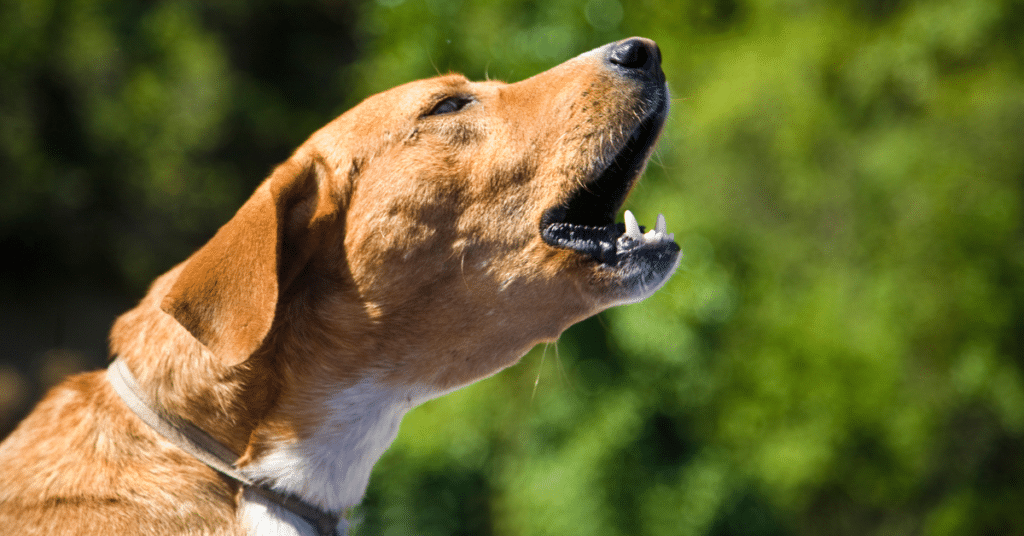While it may seem odd, just like humans, our pups can experience digestive problems too. From gulping down food too fast to eating food that doesn’t agree with them, a dog’s digestive system is just as sensitive as a human’s—including producing excess gas. But do dogs burp too?
Yes! Dogs burp for a number of reasons including swallowing too much air while eating, dietary factors (like eating gas-causing foods), and anxiety. Burping is rarely a sign of health issues, but understanding the why behind your dog’s burping can help you keep your pup more comfortable.
In this article, we’ll explore the common causes behind dog burping and what you can do to minimize it.

Understanding Your Dog’s Digestive System
Dogs have a digestive system that works similarly to humans, but there are a few key differences.
The process starts when your dog chews and swallows food (sometimes swallowing air). Once the food reaches the dog’s stomach, acids break it down into nutrients absorbed by the intestines.
Problems in this process can lead to excessive gas. For instance, some foods (particularly starchy foods and soluble fibers) can release these gasses while digesting, leading to burping and flatulence. It’s these gasses that are one of the primary causes of burping.
Why Do Dogs Burp?
Here are some of the most common reasons you might hear a dog burping.
1. Swallowing Air (Aerophagia)
One of the most common (and benign) reasons to hear a dog burping is due to swallowing air, known as aerophagia. This can happen in any dog that eats or drinks too quickly, leading to air getting trapped in the stomach. As a result, your dog burps this excess gas.
Aerophagia is significantly more common in brachycephalic dogs, such as Shih Tzus and Bulldogs.
2. Dietary Factors
Certain foods can contribute to a dog burping, especially if they have a sensitivity or allergy. Sudden dietary changes can also upset your dog’s digestive system, making burping a more common occurrence.
Certain foods can also increase gassiness. Feeding dogs an easier-to-digest diet can decrease burping. Soybean meal can increase gassiness, which can lead to flatulence and burping.
3. Anxiety and Stress
Dogs, just like humans, can experience digestive problems due to anxiety and stress. Nervous dogs can swallow more air when they become over-excited, resulting in excess gas and burping.
Stress can also lead to indigestion and even cause changes in a dog’s microbiome, causing discomfort and gas.

When is Burping in Dogs a Problem?
While occasional burping isn’t usually a problem, there are some signs it might be serious.
1. Gastric Dilation-Volvulus
Burping can be an early sign of a serious condition called Gastric Dilation-Volvulus (GDV), also known as bloat. This condition occurs when the stomach fills with excess gas and twists, eventually cutting off the blood supply to the surrounding tissue. GDV occurs most often in larger dogs and requires emergency treatment by a vet.
Other symptoms include signs of distress (such as an inability to get comfortable), a visibly bloated abdomen, and unproductive vomiting.
2. Gastrointestinal Issues
Frequent or excessive dog burping might also indicate underlying gastrointestinal issues such as acid reflux, gastritis, or food allergies and intolerances. Often, these conditions are accompanied by vomiting, diarrhea, or a lack of appetite.
While these conditions aren’t serious, they do require veterinary attention.
3. Parasites or Toxins
Some parasites and toxins can upset your their digestive system, leading to a dog burping. Once again, these problems often come with other signs of digestive upset, like vomiting and diarrhea.
For instance, roundworm infections often result in recurrent diarrhea.
How to Reduce Your Dog’s Burping
Reducing dog burping begins with addressing your dog’s diet and eating routine. Here are some tips:
- Puzzle feeders: For instance, if your dog tends to “wolf” down their food, invest in a slow feeder or puzzle bowl to slow them down and prevent them from swallowing excess air. This is also great enrichment!
- Split their meal: Sometimes, simply splitting their food into several smaller meals rather than one large one can help.
- Switch your dog’s diet: You may need to switch your dog’s diet too. Fatty and highly processed foods can cause gas buildup, leading to burping. Some dogs are sensitive to specific ingredients, and you may need to do some trial-and-error to find a food that works for your pup. For instance, my dog is sensitive to fish-heavy dog foods. If he eats dog food that contains a lot of fish, he tends to get gassy.
- Anxiety reduction: Keeping your dog calm and reducing anxiety can also reduce burping, especially if your dog tends to be high-strung. If your dog has serious problems with anxiety, your vet can help you come up with solutions.

When to See a Vet
While occasional dog burping is normal, there are times when it’s important to consult a vet. If your dog suddenly starts burping a lot more than usual, especially if accompanied by symptoms like vomiting, diarrhea, and bloating, it could indicate a more serious medical problem like GDV.
Dog burping and excess gas themselves are rarely a sign of something serious (and mostly just happen because they swallow air), but they can be troublesome when paired with other symptoms!
If your dog shows signs of discomfort, lethargy, or difficulty breathing (or there is excessive burping), it’s crucial to seek veterinary attention right away. Often, early detection and treatment can prevent more serious health complications.










